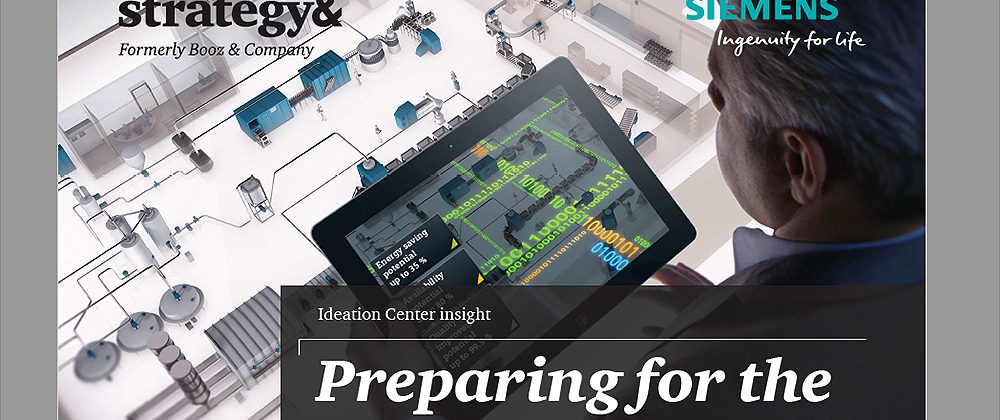A joint study conducted by Siemens and the Ideation Centre at the management consultancy Strategy&, formerly Booz & Company, part of the PwC network, emphasised the benefits businesses in GCC can gain from digitalisation. It has outlined a roadmap of how they can undertake a holistic approach to embarking on a digital transformation.
Senior executives from Siemens Middle East and Strategy& launched the Preparing for the digital era: the state of digitalisation in GCC businesses, report at Dubai’s 3D-printed Office of the Future, highlighting key findings from the joint study that are intended to help encourage the progress and evolution of digitalisation among the region’s businesses.
Of the 300 companies surveyed, 60% believe that digitalisation has the potential to create new business models or lead to a more open culture of innovation. However, only 3% of organisations believe they are at an advanced stage of their digital transformation process, with only 18% using the cloud and 30% using big data and analytics specifically.
The study also found that GCC companies are lagging behind their government and consumer counterparts when it comes to using digital technologies.
For example, GCC governments have acknowledged the economic and social benefits of digitalisation, incorporating them into their ambitious strategies. Saudi Arabia’s Vision 2030 and National Transformation Plan 2020, Smart Dubai, Qatar’s Connect 2020 ICT Policy, and Oman’s digital strategy e-Oman all stress the importance of the use of digital technologies.
Similarly, GCC consumers are among the most tech-savvy in the world. The UAE, Qatar and Bahrain have more than 100% smartphone penetration rates and young people across the region are playing an important role in influencing the development of new technologies.
“Governments and consumers in the GCC have been rapid adopters of digital technologies, and our report tells us the benefits of digitalisation are widely acknowledged by the majority of organisations,” said Dietmar Siersdorfer, CEO, Siemens Middle East and UAE.
“However, many companies in the region have some catching up to do, and our research suggests there is still work to be done to encourage the understanding that digitalisation is a transformation journey, requiring a holistic approach. Companies must develop a business strategy for the digital age, and finding the right partners is essential. The GCC is taking great strides towards economic diversification, and digitalisation is a key driver of globally competitive business, industry and infrastructure. The region is in a position to fully embrace the disruptive potential of digitalisation, across all sectors.”
Though GCC company executives show great enthusiasm for going digital, many are still coming to grips with its full meaning and potential. In general, executives have a narrow view of digitalisation which often ignores the far-reaching benefits that moving towards digital can bring, such as problem solving, reinventing business models, reimagining the customer experience, inspiring trust and accelerating change. The fact that many organisations have a partial understanding restrains the uptake of digital technology and obstructs the formulation of effective strategies.
Discussing the use of digital technology in the GCC, Samer Bohsali, Partner with Strategy& in Dubai, said: “Executives in the GCC are excited by digital. They recognise its benefits, such as stronger customer orientation and increased efficiency, which is vital in an era of budget constraints. Many companies, however, perceive the process of going digital as the adoption of a specific technology, rather than a transformation journey.”
While many organisations are gradually building technology capabilities, some lack the vision and the necessary leadership to drive their digital transformation. Taking practical steps forward can often be beset by internal obstacles, be they cultural, organisational, people-related or financial. For example, 40% of companies in the region have allocated less than 5% of their total investments to digitalisation activities. Only 37% of companies have a strategy for going digital, and less than 1% of companies have a Chief Digital Officer.
There is also work to be done on the infrastructure and regulation front, as well as tackling skill deficiencies in areas such as data analytics and human centric design, which are vital for the development of the region’s digital ecosystem.
However, there is a way forward for GCC companies to fully realise the benefits of digital technologies. Instead of simply importing best digital practices and technology, the Strategy& and Siemens report recommends that GCC organisations should approach this transformation holistically by creating the building blocks for digital transformation.
- Organisations need a business strategy for the digital era. This requires assessing digitalisation’s impact on their industry and its fit with their ambitions
- They must identify those areas of their business where digitalisation can help the most, and how
- Digital change requires senior sponsorship and proper governance. Digitalisation should be an organisation-wide collaborative effort, not the sole preserve of IT or marketing
- They must develop digital skills, in IT and across the organisation
- They should collaborate with stakeholders across the ecosystem including digital players and disrupters, government entities and academia, embracing open innovation
- They should invest more wisely, not necessarily spend more, thereby accommodating investment risk. Companies can achieve savings by outsourcing commoditised technology services, including the adoption of cloud and virtualisation, and invest the savings in differentiated value-adding digital capabilities





